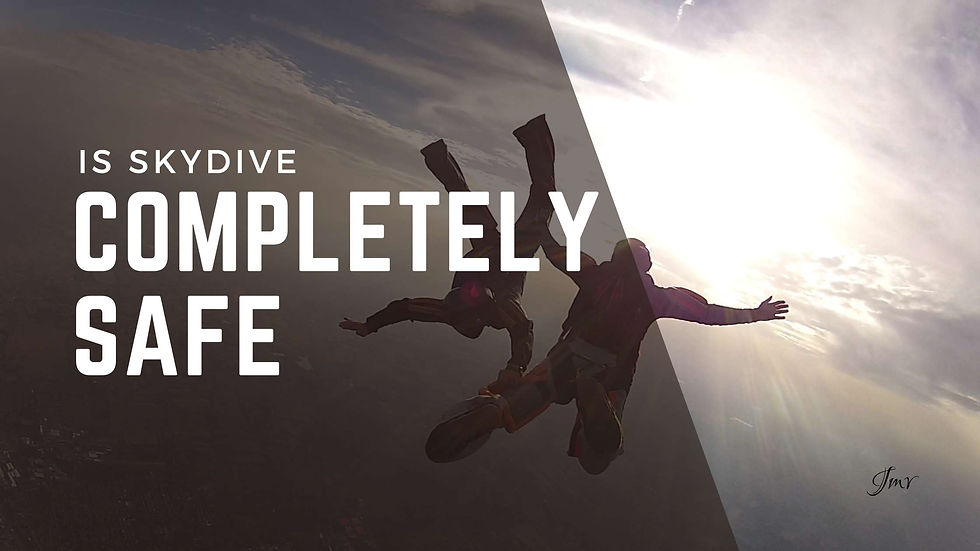Skydiving: An Inclusive Adventure for Everyone – What You Need to Know
- JMV
- Jun 1, 2024
- 3 min read
Skydiving is often seen as an extreme sport reserved for adrenaline junkies, but it is becoming increasingly popular among a diverse range of people. With advancements in safety measures and training, skydiving has become more accessible and inclusive than ever. This guide covers essential aspects of skydiving, from safety to myths, making it clear that skydiving can be an adventure for almost everyone.

Is Skydiving Completely Safe? Safety is a primary concern for many considering skydiving. Modern skydiving has a strong safety record due to rigorous training, advanced equipment, and strict regulations.
Safety Measures: Skydiving centers follow strict protocols, including thorough equipment checks, tandem jumps with experienced instructors for beginners, and extensive training.
Statistics: According to the United States Parachute Association (USPA), there were approximately 3.3 million jumps in 2019 with a fatality rate of 0.39 per 100,000 jumps. This makes skydiving safer than many other recreational activities.
Weight and Age Limits Skydiving is an inclusive sport, but there are some weight and age restrictions to ensure safety and comfort.

Weight Limits: Most skydiving centers have a maximum weight limit, typically around 100-110 kg. However, this can vary, and some centers can accommodate individuals up to 122 kg with special equipment and additional fees.
Age Limits: The minimum age for skydiving in most countries is 18 years old. Some places allow tandem jumps for minors (usually aged 16-17) with parental consent. There is no upper age limit; the oldest recorded skydiver is 103-year-old Al Blaschke, who jumped in Texas in 2020.
Physical and Medical Considerations While skydiving is accessible to many, certain physical and medical conditions may pose risks.
Who Should Avoid Skydiving: Individuals with severe heart conditions, uncontrolled high blood pressure, epilepsy, or significant spinal injuries should avoid skydiving.
Physical Conditions: Those with minor health issues or disabilities should consult with their doctor and the skydiving center. Many centers have adapted equipment and trained staff to assist people with disabilities.
Skydiving Myths and Realities There are numerous myths and misconceptions about skydiving that can deter potential jumpers.
Can You Faint While Skydiving?: Fainting is rare. The adrenaline rush typically keeps people alert and aware.
Can You Scream While Skydiving?: Yes, but you might not hear yourself due to the wind noise.
Can You Feel Sick?: Motion sickness is uncommon during freefall but can occur under the parachute if the canopy turns are too aggressive. Inform your instructor if you’re prone to motion sickness.
Accessibility Skydiving can be enjoyed by various age groups and people with disabilities.
Older Adults: Many older adults take up skydiving as a bucket-list activity. There are no upper age limits as long as the individual is in good health.
Kids: While the minimum age for solo jumps is generally 18, tandem jumps are sometimes available for younger teens with parental consent.
People with Disabilities: Adaptive skydiving programs are available for those with physical disabilities. Tandem jumps with trained instructors ensure a safe and thrilling experience.

Global Perspectives Skydiving regulations and experiences can vary significantly around the world.
United States: The USPA governs skydiving, ensuring high safety standards and accessible training programs.
United Kingdom: The British Parachute Association (BPA) regulates skydiving, and the country offers numerous scenic drop zones.
Australia: Known for stunning drop zones like those over the Great Barrier Reef, the Australian Parachute Federation (APF) oversees safety and training.
New Zealand: A top destination for adventure sports, with strict regulations and breathtaking landscapes for skydiving.
India: Skydiving is growing, with strict safety regulations and training standards enforced by local authorities, offering unique cultural experiences alongside the sport.
Skydiving is a thrilling, life-changing experience that is more accessible and safer than ever before. By understanding the safety measures, weight and age limits, physical considerations, and debunking common myths, potential skydivers can make informed decisions. Whether you're a young adventurer, an older adult, or someone with physical limitations, skydiving offers an inclusive adventure that everyone can enjoy. Are you ready to take the leap?




Comments